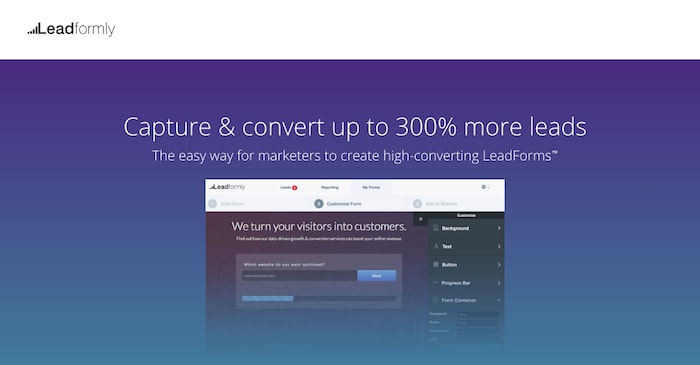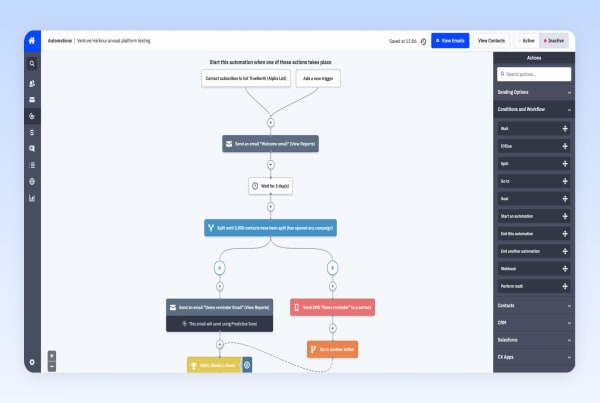Two fundamental truths exist when marketing a startup. One is that a great product alone is not enough to succeed. The other is that no amount of marketing will make a crap product gain a mass audience.
“Nothing kills a bad company faster than good marketing”
Successful startup marketing requires that you have both a great product and great marketing. For that reason, I’ve focused this guide on both customer acquisition and improving your product-market fit.
The Foundations of Startup Marketing
For early-stage startups, feedback is often more important than customers. The faster you can resolve user objections, and improve the product to match market demand, the more likely you are to win over the long run.
In this chapter we’re going to look at seven essential aspects of laying the foundations for an aggressive marketing strategy.
- Finding Your Core Channel
- Growth hacking – building marketing into your product
- Conversion rate optimisation
- Using Facebook ads to understand your audience
- Customer feedback loops
- The diffusion of innovation & targeting early adopters
- Fine-tuning your messaging
- Differentiation
#1 Finding Your Core Channel
When you’re starting out, the most important objective is to test until you find one core marketing channel that, when you double down on, becomes your growth lever.
This requires you to systematically experiment with many channels early-on to eliminate low-performing channels and find one that has all the traits of a winning core channel.
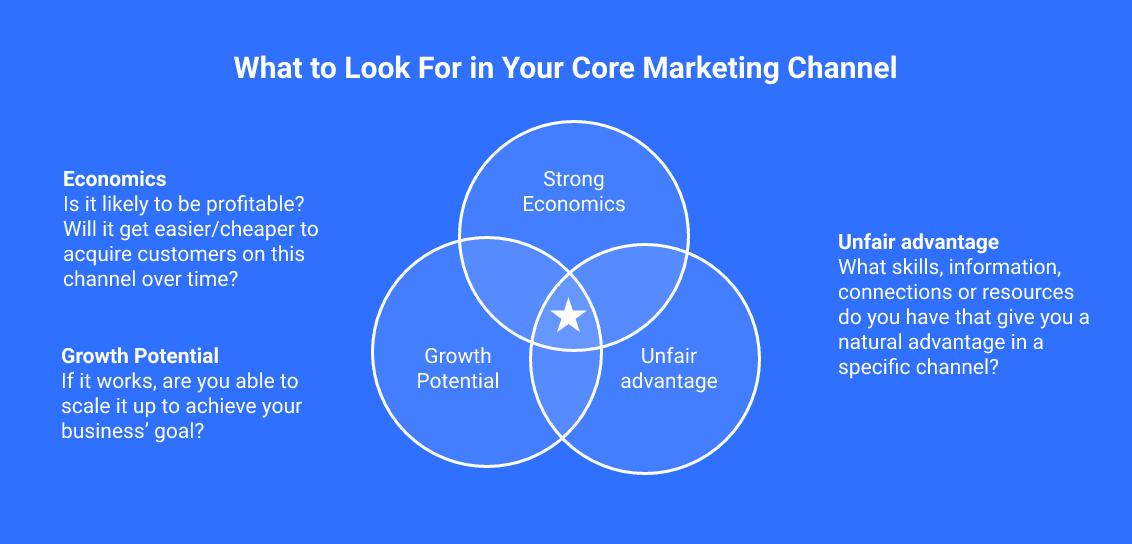
To prevent insights and performance being fragmented all over the place (and to keep you precious budget in check), it’s recommended to put a system in place to plan your experiments and track their performance like-for-like.
While you could do this in a spreadsheet, a platform like TrueNorth will save you time and help you focus all of your campaigns on achieving your growth goals.
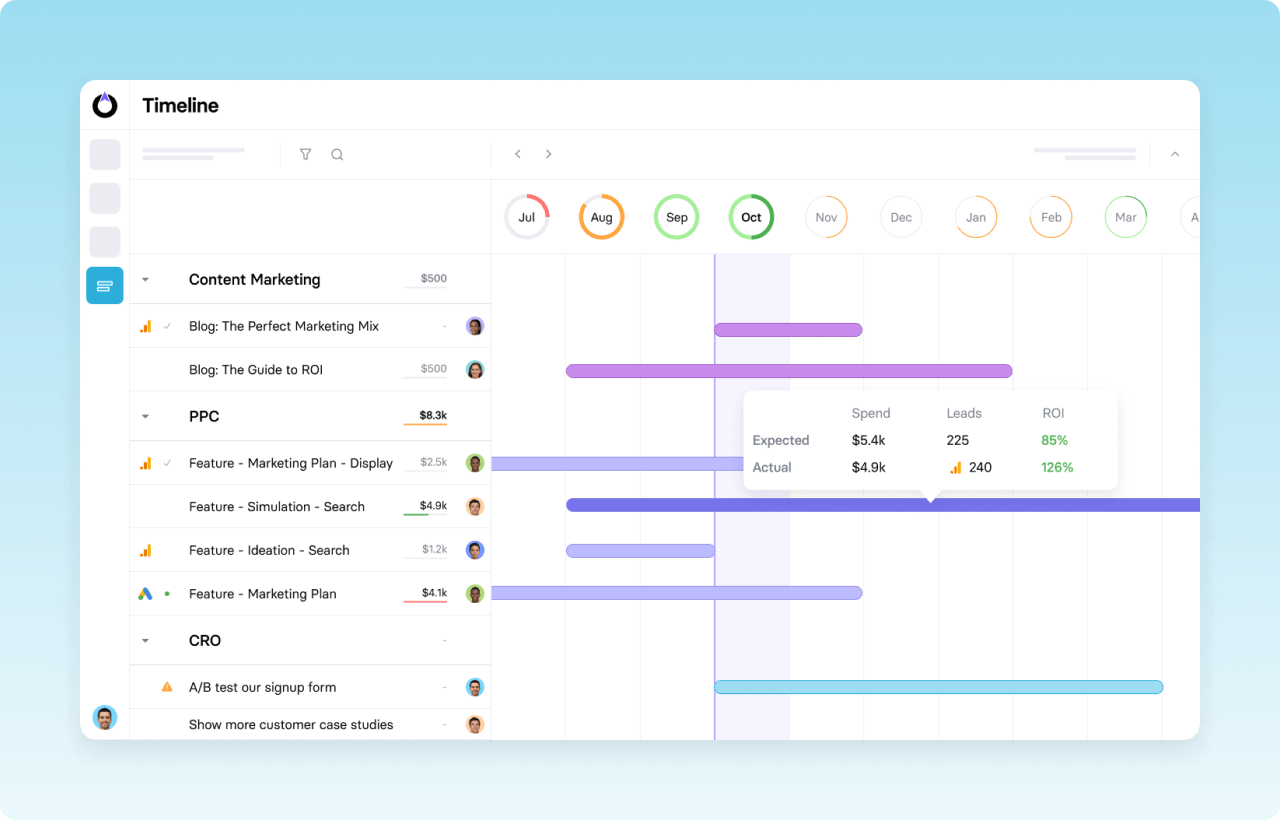
#2 Viral Marketing & Growth Hacking: Building Marketing Into Your Product
“Marketing is for companies with sucky products”
Fred Wilson, VC
I disagree with Fred Wilson’s quote, yet I can’t dispute that the most successful startup marketing strategies are those that embed marketing into their product.
Dropbox, Hotmail, Eventbrite, Mailbox, and Snapchat famously acquired millions of users with almost no money spent on marketing. Their secret? Building virality into their product.
A startup’s ability to grow virally depends on two variables: time, and the ‘viral coefficient’ i.e. the number of new users each user generates.
Below is a graph to illustrate startup growth at different rates based on varying viral coefficients. Imagine that the Y-axis represents your number of user sign-ups, and the X-axis represents time.

If your viral coefficient is 1.0 (each user generates one new user), you will achieve linear growth, assuming you retain your users. If you have a viral coefficient above 1.1, you will achieve exponential growth as illustrated by all of the lines above the lower green line.
How do you embed marketing into your product?
Every startup is unique, so I won’t discuss tactical methods in great detail. There are two broad strategies, though: The first is to build a product worth recommending. If every single user recommends two new users, you have exponential growth.
The easiest method of measuring a user’s likelihood to recommend your startup is by using the Net Promote Score, a simple test where you ask users “on a scale of 1-10, how likely are you to recommend our product to a friend?” If the aggregate score is above 9.0, you will likely achieve exponential growth.
The second strategy is to align your ‘growth hack’ with the channel(s) that your ideal customers use to learn about your product.
“To be successful, you must match the way you market your products with the way your prospects learn about and shop for your products.” – Brian Halligan, HubSpot
In the context of growth hacking, it’s no good if your growth hack generates enormous exposure for your brand on Facebook – if 99% of your best-fit customers coming from reading B2B whitepapers. If that were the case, a better approach would be to produce user-generated content that could be used to scale producing high-quality whitepapers.
#3 Conversion Rate Optimisation: Increase your sign-ups with split-test experiments
Conversion rate optimisation (CRO) is the science behind understanding why your visitors are not ‘converting’ into customers, and then improving your messaging or value proposition to increase this rate of conversions. Contrary to popular belief, it does not start with running A/B experiments; it starts with understanding your visitors and their objections.
How to identify customer objections:
The fastest way to understand why potential customers are not converting is to ask them. Below are several tools and techniques that I’d recommend.
- Install Intercom – a great tool that allows you to talk in real time with website visitors.
- Ask visitors to fill out a survey using Survey Monkey. Usually, you’ll need to incentivise this with some kind of giveaway.
- Ask for feedback in a forum your customers participate on.
- Commission some user tests from UserTesting.com.
- Invite someone you know (a customer) to lunch / Skype.
Following this, hopefully you will have a good idea of what is preventing your visitors from converting. Now it’s time to make changes to your landing page to counter these objections.
The first thing I’d recommend is focusing on the areas with the most leverage. Focus on your headlines, call to actions, and your homepage landing page experience.
The following model by Conversion.com is also a fantastic starting point for understanding how to improve the likelihood of a conversion. Whenever I am presented with a CRO problem, I like to consider how we could improve each point. For example, can we reduce the navigation to minimise distractions? Could we increase the urgency by having a countdown timer or an “Only X left” next to our call-to-actions?
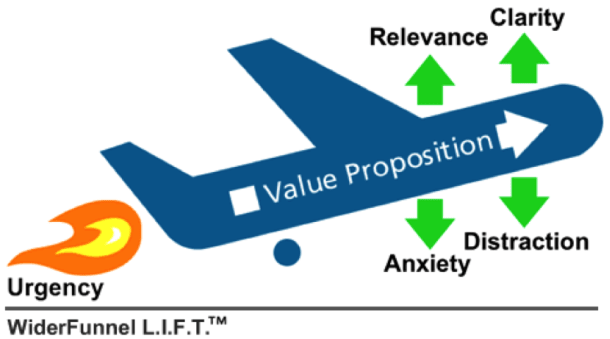
Once you have your mockups designed, you can use an A/B testing tool to test them against your existing landing page for free.
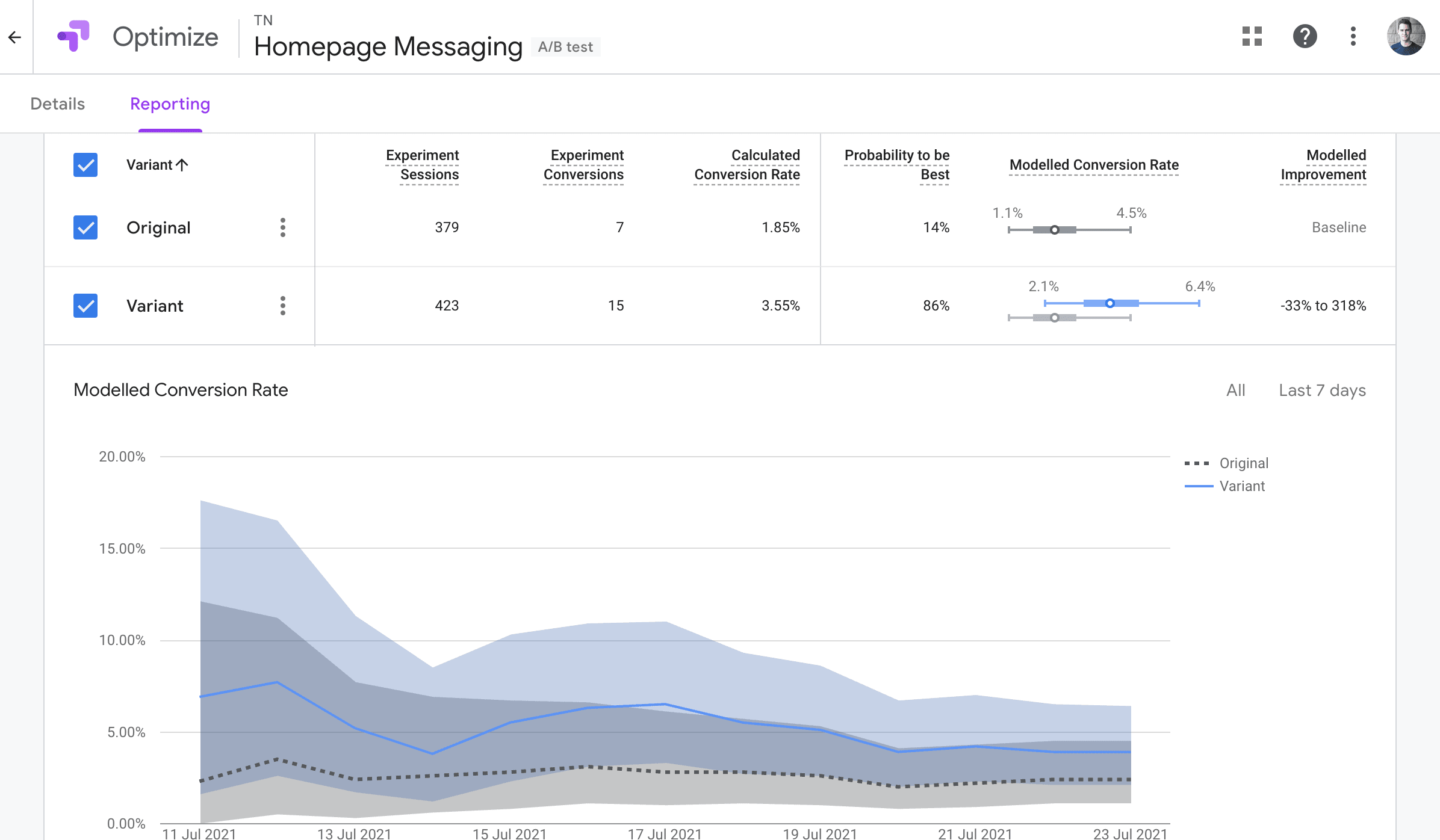
Conversion rate optimisation is not something you do once. You should strive to constantly tweak and improve your landing pages to make incremental improvements.
Equally, know that incremental tweaks will always hit a limit. There’s often far more opportunity in being bold and testing something very different.

#4 Facebook Advertising: Finding your perfect audience using segmentation
Most people think of Facebook Ads as an acquisition channel for driving sign-ups. The truth is that it’s also one of the best customer research tools we have available to us.
Let me explain. There is no limit to how finely you can segment a Facebook advert. If you wanted, you could run identical adverts to 500 different demographic and psychographic audience segments. Using conversion tracking, you can see which demographics and psychographics then have the highest conversion rate on your service.
Here are a few examples. I work with many music startups, and I’ve found time and time again that guitarists are typically more likely to sign up to a music service than a drummer or a bassist. For one of our clients, FanDistro, we found that 23-year-old Canadians are approximately 3x more likely to convert than 21-year-olds. We know that musicians in New Zealand are more likely to convert than Australians.
Facebook Ads are, in my opinion, the best way to quickly and affordably verify who your audience are, and what your cost-per-acquisition is for different demographic groups.
#5 Installing a Customer Feedback Loop
It’s worth reiterating that the most important asset for most startups is to be told what needs improving, and have an agile system for making those improvements. Anyone who’s read Eric Ries’ book The Lean Startup will understand this as the ‘Iteration Cycle’.
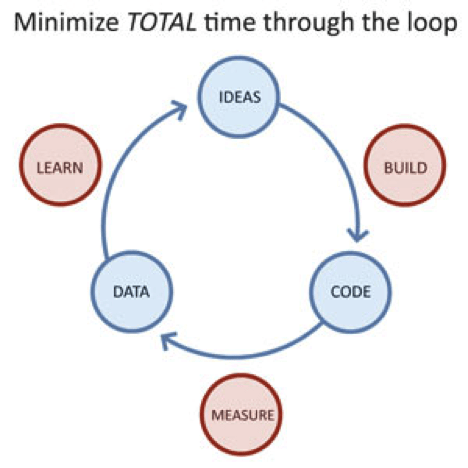
A simple ‘give us feedback’ form is not enough. Most people will not go out of their way to give you feedback. Use incentives, meet your users, and study user behavior data to understand where people fall off in your funnel, and more importantly – why?
#6 Diffusion of Innovation: Targeting Early Adopters
Many inexperienced marketers make the mistake of targeting the mass market too soon. The reason this rarely works is because the majority of people resist change, and are not receptive to products/services that are not already recommended by early adopters.
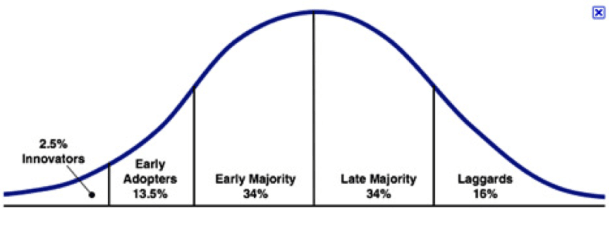
I learned this lesson through A/B testing. Two years ago, while running an experiment to see whether additional social proof increased sign-up rates, I found that by simply adding the number of likes and users already signed up next to the sign-up button, had a dramatic impact on increasing the website’s sign-up rate.
If you want to own the majority market share, your initial launch strategy and messaging must appeal to innovators and early adopters. Once you have a number of case studies, testimonials, and respected innovators singing your praises, then it’s time to approach the majority. The laggards will follow.
#7 Why, What, How: Fine-Tuning Your Messaging for Conversion
If you haven’t read Simon Sinek’s book ‘Start With Why’, I’d strongly recommend putting it on order.
The gist of the book is that, if you want to inspire someone to take action, you must begin by explaining why you do what you do. Not what or how.
Apple is a great example of a company that sells “why”. Apple challenges the status quo with everything they do – MacBooks, iTunes and iPads are just how they do that. Dell don’t have a why – they just sell reasonably good computers. While Apple talk about pushing humanity forward and challenging the status quo, Dell talk about the size of their processors and RAM. Is it any wonder why people queue for hours to get the latest product, while Dell receive nowhere near the level of advocacy, despite their products being very similar.
In the example below, the headline is ‘Capture & convert up to 300% more leads’. This doesn’t tell visitors anything about what or how the product works, but it gives a compelling ‘why’, followed by a subheading that explains what the product is and how it works.
Does your messaging communicate why your startup exists? Do you know your why? If not, this is an important step that I would not advise skipping over.
#8 Differentiation in your marketing
Various studies predict we see between 1,000 – 5,000 advertisements per day depending on where we live. How do you compete and stand out with your marketing in such a saturated space?
The answer is by being the shepherd, not a sheep.
Our brain categorises similar pieces of information together, a process known as Gestalt. Because of this, the more of a similar thing we see, the less impact each additional thing has. When Lady Gaga wore a dress made of meat it made headlines all over the World. When others copied her quirkiness, hardly anyone talked. This pattern has repeated itself millions of times over.
This is not about first-mover advantage; this is about observing what everyone else is, and being the opposite. Apply this from the most macro aspect of your strategy down to the micro, and you’ll be amazed at how significant this is.
Now that we’ve covered off the foundations of messaging and preparing your product for a successful marketing strategy, let’s move on to customer acquisition. I’ve split the section on customer acquisition into three chapters, paid media, earned media, and owned media.
Paid Media Marketing for Startups
There’s a school of thought that says startups should spend as little as possible on marketing. I disagree. I believe that marketing should focus on positive ROI (return on investment). If a paid media channel can profitably drive qualified users for your startup, it’d be foolish to refuse it on the basis that it’s paid for. Another reason for using paid media is to establish a cost-per-acquisition, as this will act as a benchmark to compare all other marketing activity.
Paid media channels fall into three broad categories: display, search, and affiliate marketing. Below are some of the main online channels I’d recommend looking into, along with some tips on each.
#8 Facebook Advertising
We’ve already discussed Facebook Ads from a research perspective, but let’s consider it now as a channel for acquiring users.
While it’s possible to write a guide of this length on Facebook Ads alone, I’ll quickly summarise some of my recommendations based on a considerable amount of Facebook Ad campaigns that I’ve worked on.
- Use page promoted posts targeting people in the news feed. These ads have the highest click-through and engagement rates.
- Test as many advert variations as possible. The weirder, brighter, and more unique your ad is, the better. When everyone else zigs, zag.
- Don’t create ads using the Facebook Ad Manager (it’s awful). Either use the power editor, or a dedicated tool like Qwaya. This will make segmentation much easier.
- Use conversion tracking – by installing the conversion pixel you enable oCPM for conversion bidding. This basically means that Facebook will algorithmically optimise your budget for more conversions.
- Use fine segmentation – If you use Qwaya, you can split your ad campaign into tens or hundreds of individual ads each targeting a specific segment of your audience. This enables you to quickly see which ad segments perform well and which don’t, so you can move your budget to the segments that are most profitable.
#9 Google Ads (Search)
If your product solves an issue that people search for, there’s a high likelihood that Google Ads will be a great acquisition channel for you. For example, if your startup helps people find the cheapest gig tickets, you may want to bid on terms like ‘cheap gig ticket’, ‘London gig tickets’, and ‘Gaslight Anthem London Roundhouse tickets’.
#10 Google Adwords (Display)
Similarly to above, Google enable you to purchase banner adverts through their display network. You can specify which websites your banner ad appears on, or bid to appear on websites related to certain keywords.
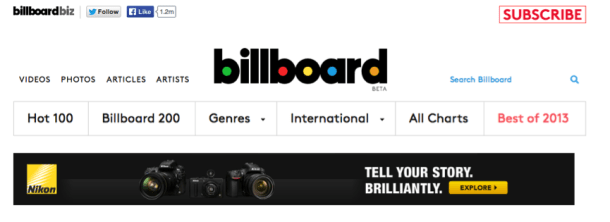
An example of Nikon using Google Display Network to run adverts on Billboard.com.
#11 Reddit Advertising
Reddit is often overlooked as a paid marketing channel. I have to admit, the results I’ve had in the past are extremely varied, but it’s very cheap and always worth testing.
Reddit advertising works by running ads at the top of any subreddit of your choice. For example, for a music client, we may advertise in the subreddits ‘WeAretheMusicMakers’, ‘Music’, and ‘Guitar’. Each subreddit has a very distinct community, so it pays to get involved in each one for a bit of time first before running ads.
One specific reason why I’m a fan of Reddit Advertising is that Reddit seems to attract the early adopter types. It’s a great place for getting honest feedback and targeting people who are likely to be receptive regardless of what stage your product’s at.
#12 Google Remarketing
Google Remarketing goes one step beyond the standard display advertising mentioned above. Essentially, when someone visits your website a cookie is dropped on their computer. When they visit other websites, an ad will appear encouraging them to come back to your website.
You can get very smart with this by running different remarketing ads for different stages of your sign-up funnel. For example, if they visited the sign-up page but didn’t complete the form, you could run an ad with an incentive to finish signing up.
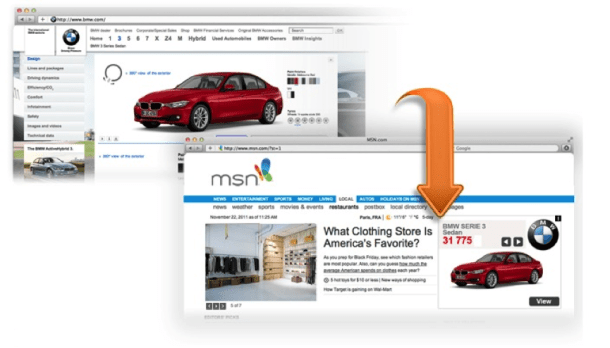
Google Remarketing is generally very effective as the people you’re advertising to are qualified and already aware of your product. The trick is to get the frequency right and not be overly annoying!
#13 Facebook Exchange
Facebook Exchange works in a very similar to Google Remarketing, but using Facebook Ads instead. In other words, someone visits your website and bounces. When they go to Facebook they’ll find your ads encouraging them to come back.
To use Facebook Exchange you’ll need to use one of their partners. I’ve tested a handful of them and recommend AdRoll.
#14 StumbleUpon Advertising
While the quality of visitors from StumbleUpon is generally quite low, the cost per click is exceptionally low also, enabling you to buy a large amount of traffic for a low cost.
I’ve yet to see astounding results from StumbleUpon ads, except for travel related content. StumbleUpon is very visual social network where inspirational and stimulating content seems to spread virally. If you’re a luxury travel operator, this is a gold mine. If you a SAAS company promoting an app, it may be a bit trickier.
#15 Twitter Advertising
Twitter Ads can be very effective, but the reason I haven’t recommended them sooner is due to the budget limitations. Currently, the minimum budget for a Twitter Ad campaign is £5,000/month, which is outside of most startup’s budget. If you do have this sort of budget to invest, then Twitter Ads do tend to be pretty effective when done right.
My advice would be to promote an amazing piece of content rather than directly promoting your services. View Twitter as a 1:many platform where, if you run your ads correctly, you can launch your content to a large audience who will introduce your content to an even larger audience.
If your campaign dies after being promoted to the initial audience, start again.
#16 Content Discovery Platforms
There are a number of content discovery platforms that promote your content alongside articles on major news sites such as the New York Times and The Guardian.
I’ve tested a handful of these, including Outbrain, Zemanta, nRelate and Taboola. For driving backlinks and launching content they’re a powerful tool, although they can get quite expensive depending on the quality of your content.
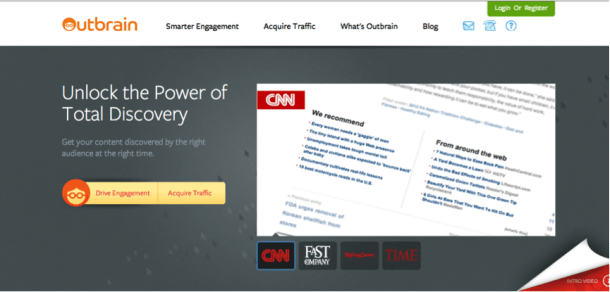
#17 LinkedIn Advertising
While my personal experiences with LinkedIn advertising has not been particularly positive, I know of a few startups (particularly in the financial services industry) that have achieved great results by running targeted ads to people by their job title and sector.
In my opinion, the problem with LinkedIn Ads is banner blindness. The adverts don’t stand out, and appear in the same spot on every page, causing users to become ‘blind’ to them.
#18 Video Pre-Roll Advertising
If your startup has produced a compelling promo video, pre-roll advertising could be a powerful paid marketing channel for you.
One interesting ‘trick’ with pre-roll advertising is that you do not pay if your ad is skipped within the first five seconds (which most people do skip). The trick, then, is to go down one of two routes. The first route is to get the message out about your service within the first five seconds of the video hoping that people skip so that you can expose your message to a huge number of people without paying too much.
The second option is to make the first five seconds ambiguous and weird enough to intrigue people to watch the rest of the video. Here’s the best example I’ve seen of this tactic being put into practice.
#19 Affiliate marketing
If your startup benefits from offering a high-margin product and has a good conversion rate, then you may benefit from offering an affiliate program through a network such as Affiliate Window or ClickBank.
I wouldn’t advise diving into affiliate marketing until you’ve already established your brand and found other marketing channels. Consider it more of an accelerant rather than a base fuel for your online marketing strategy.
Earned Media Marketing for Startups
Earned media can be thought of as any form of publicity generated by your advocates (customers, fans, partners). In my opinion, earned media is the most valuable, cost-effective, credible, and sustainable form of online marketing. It’s also the hardest to create and measure.
The reason earned media is so effective is that people trust their friend’s recommendations. Conversely, our trust in virtually all other forms of paid & owned media advertising is declining.
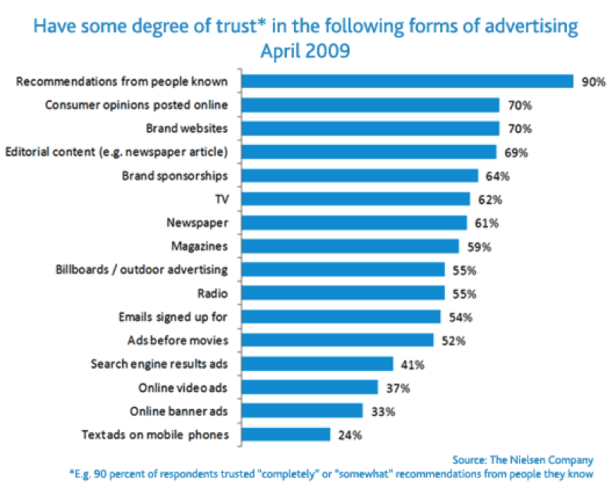
So how can you leverage this shift in trust to drive more sales / sign-ups?
#20 Do Something Remarkable
The secret sauce of the PR industry is that remarkable things get remarked upon. If you want to earn word of mouth and have the press, your customers, and whoever else talking about your startup, you must give them something remarkable.
Now, this doesn’t necessarily mean you have to build a full-scale dragon skeleton on a beach in Dorset, or fly jetpacks around New York City, but if you want to cause a ripple, you’ll need to do something beyond the norm. Perhaps your startup is remarkable in itself?
As much as I’d love to say “do X”, there is no simple answer here, because quite often it’s the things that haven’t been done before that are work the best. My best advice is to read Edward De Bono’s book on Lateral Thinking (he pioneered the word ‘lateral thinking’), get some post-it notes and blast out as many ideas as you can conjure up. Then go for the idea that’s most promising.
#21 Build Exceptional Resources
I struggle to go a week without mentioning Moz.com’s weather report tool. It’s an incredibly useful resource for the SEO industry and generates enormous amounts of publicity for Moz.
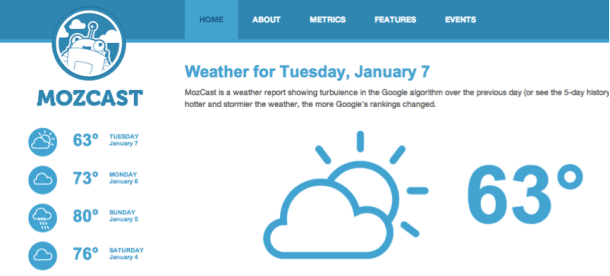
Sometimes you don’t need to reinvent the wheel – you just need to ask yourself “what would our customers find useful?” and build something exceptional.
#22 Meet Your Influencers
How valuable would it be to your startup if you met Robert Scoble, Jack Dorsey, or some TechCrunch journalist? A large aspect of your success in PR and marketing does revolve around who you know, so it’s important to learn what affects the size and quality of your personal network.
Meeting anyone starts with being in the same space as them, either geographically or virtually. Last January I was speaking at Midem, a music conference in the South of France. While over there I met Robert Scoble, Mark Hoppus from Blink 182, and a number of interesting people who’ve become invaluable contacts. I don’t say this to boast, but to make the point that it was incredibly predictable and well-publicised that these people would be at Midem on the specified dates – all I had to do was show up. The hardest part in meeting the people you need to meet is booking the ticket and showing up.
“80% of success is showing up” – Woody Allen
#23 Search Engine Optimisation (SEO)
Over 500 million people search in Google every day. Regardless of what some startup celebrities may proclaim, SEO is not something you should ignore.
The strength of search marketing is that, if you have a product that people are looking for, your site can appear at the perfect moment – when they’re searching for it.
This differs to Facebook, LinkedIn, and YouTube advertising, where you’re relying on distraction to pull people away from what they were doing to visit your website. With Google, you’re helping them find what they were looking for in the first place.
Organic search marketing is a broad field in itself, so I won’t go into much depth at all here. However, I will impart a few pieces of advice from my experience working at an SEO agency for several years, and overseeing hundreds of campaigns.
- Don’t think you’re saving money by hiring a cheap SEO. Rankings go both ways, and if you get someone crap, they’ll cost you a lot more than you think. Be prepared to pay a decent price for good SEO services.
- Focus on what’s best for the users – when in doubt, ask yourself “is this best for our users?” – if the answer is yes, there’s a very good chance that it’s also best for search engines.
- Nothing is guaranteed. Anyone who guarantees results is most likely selling snake oil.
- It takes time. I advise most of our clients not to expect any increase in SEO traffic for at least 3 months. Of course, sometimes we see increases in as little as a week, but SEO typically takes a long time to grow.
Owned Media Marketing for Startups
Owned media relates to any marketing channel owned by your startup. In the online world, this refers to any websites and social media profiles that you operate.
There’s a great deal of crossover between owned and earned media, and I like to think of owned media being the ‘platform’ for increasing the success of your earned campaigns.
Imagine you created a great story on how your startup just broke a World Record. Without a platform to publish the story on, your best hope is to send out a press release and cross your fingers that at least one journalist will publish the story.
If you have a blog with a steady audience of 5,000 visitors per day, you can post your story to that audience, and rest assured that at the very least, 35,000 people will have been exposed to the story by next week. Hopefully, that initial audience will have ‘launched’ your story creating organic growth.
#24 Building a Blog That Converts
Building a blog that converts is hard. Most companies fail because they blog about what they want their customers to read, rather than writing about what their customers want to read.
There are a small number of companies who understand this. Buffer, for example, are a company that offer social media automation software. Instead of going on about their services, their blog contains insights on everything from happiness to writing tips. They write what their customers want to read.
My advice when building a blog is this: if you want to create a truly successful blog, you must be willing to commit at least 100 great articles. After you’ve written 100 articles you’ll not only have a good understanding of what works, but each article will be driving a bit of traffic, a few links, and a few sign-ups each day. From there, the results will compound.
If you’re ready to kick-start your blog, check out our study on the best web hosting companies to get started with.
#25 Email Marketing
Five years ago, email marketing was about building your mailing list and sending newsletters or autoresponder campaigns out.
Those days are long gone. Traditional email marketing is rapidly being replaced by marketing automation, which is software that gives you the ability to trigger personalised messages based on different rules. For example, if someone signs up for a free trial but doesn’t actually use a certain feature within a certain amount of time, you can trigger an automated email inviting them to check it out.
Marketing is ultimately a pursuit to send the right message to the right people at the right time. Marketing automation is about as close as we can get to scaling this.
There are lots of great email marketing tools that now offer marketing automation. I personally love ActiveCampaign, which has one of the best interfaces for building marketing automation campaigns that I’ve seen.
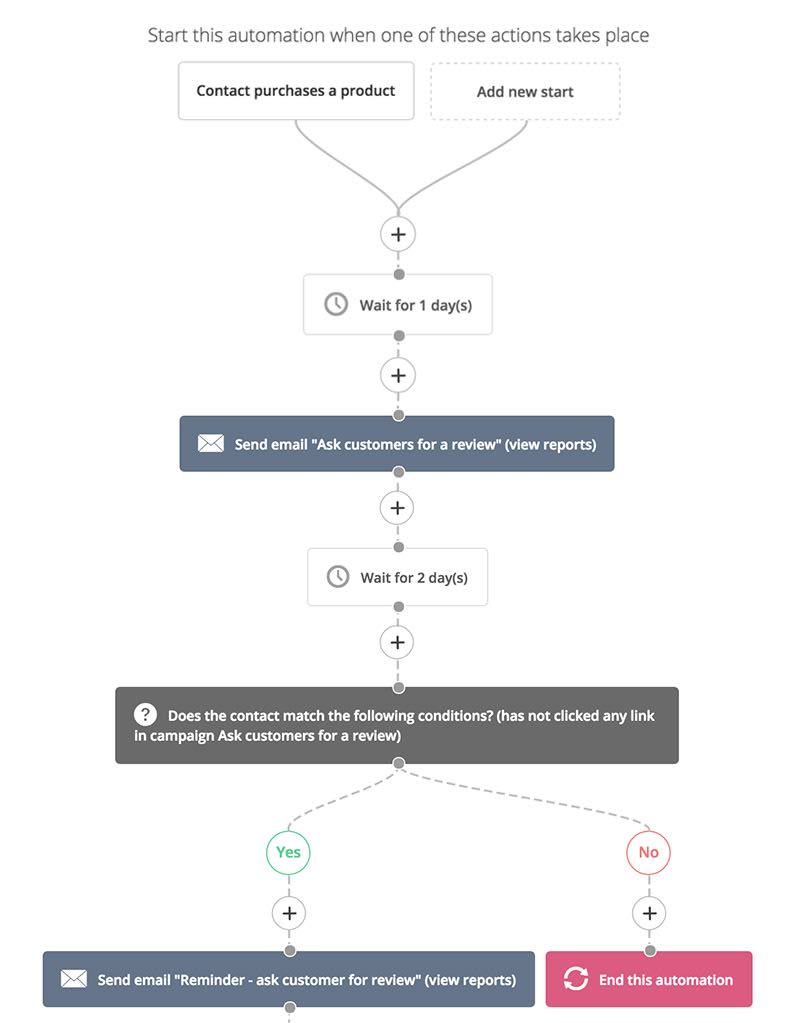
The next step is to know what makes a good email. This isn’t just about writing clickable subject lines and crafting beautiful HTML templates, it’s about understanding what your audience wants to receive in their inbox. I can’t tell you the answer here, but I urge that you consider “would I want to receive this email?”
Be sure to experiment with different frequencies of emailing, days of the week, and types. Comparing the open and click through rates over time is the only sure way to know what works and what doesn’t.
#26 Video: Leveraging the second-largest search engine in the World
We rarely think of YouTube as a search engine, but with over 50,000,000 searches made on YouTube every day, that’s effectively what it is. Using YouTube Traffic Estimator, we can see exactly how many searches are made for different queries every month.
Let’s say your startup offers time management solutions. A quick search on YouTube for videos on productivity reveals that many 3-minute videos have over 50,000 views – some have over 1,000,000.
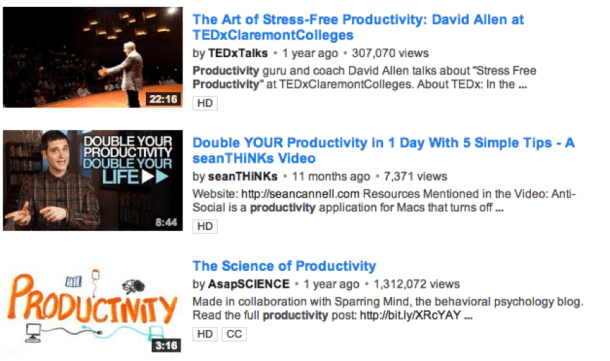
The benefit of incorporating video into your search strategy is that YouTube, and other video hosting sites, are considerably less competitive than Google. Interestingly, Google are also featuring more and more videos in their universal search results, making it a powerful method of ranking in Google in itself.
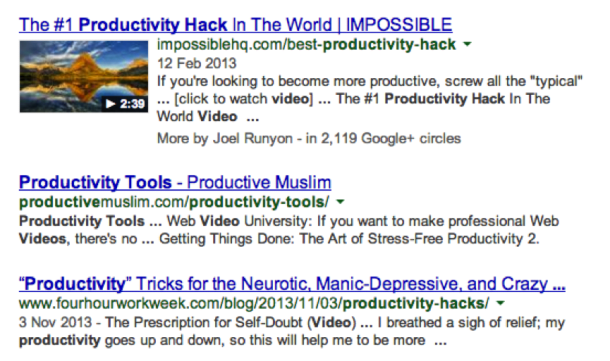
#27 Content Marketing: Infographics, Videos, Case Studies, White Papers, and more
When it comes to digital marketing, I like to think about what will work in two years time. I don’t believe content marketing will be the future, but I do think that content-based online PR will be.
I think the overlap between creating exceptional content and relationship-based PR will be what the best digital marketers will focus on a few years from now.
I won’t focus on the relationship-based part here, as I’ve already covered that in some depth in the section on meeting influencers. Let’s instead focus on what makes content exceptional.
On producing content of exceptional quality, my rule of thumb is to spend more than 40 hours producing it. Anything that takes less time is easily probably easy to replicate. That doesn’t mean you shouldn’t create it, it just means it probably won’t generate amazing results.
Don’t start your content strategy with what can we create? Start with what would be amazing? You’ll find a way to create it.
For specific tips on content marketing, I wrote a post for Moz offering 97 tips on content marketing.
#28 Building a Presence on Twitter, Facebook, Google+, and other social networks
Like email marketing, social networks provide a great opportunity to launch content and drive potential customers to your service, but there’s far more to it than broadcasting your agenda. Social networks provide a great opportunity to gather feedback, build relationships, and add credibility to your service.
While a guide on social media is far beyond the scope of this guide, here are a few important points to consider in your social strategy.
Know why you’re using it
Because of the ever-increasing number of social networks, and the endless possibilities of what you can do within social media, it’s important to know why you’re using social media from the outset.
You can have multiple reasons. Quantity is not the issue, clarity is.
Ultimately, retweets, likes and shares are meaningless. Your core business goals are what matter: user sign-ups, retention, revenue, customer lifetime value, user satisfaction etc. Social media becomes valuable when you connect the two together. When you use Twitter to leverage PR opportunities, Facebook to increase the quantity of monetisable eyeballs, or Google+ to increase search rankings, that’s when social media has a tangible value.
Know what works
I spend a lot of time in the entertainment industry understanding what content is the most shareable. While it’s good to confirm these things with data, often it just takes a few hours of research to understand what people talk about in your niche. So many companies publish crap that no one in their right mind would have a conversation about – don’t fall into that trap. Start by knowing what sparks conversations in your niche.
Lead with content
We manage a decent number of social media strategies at Venture Harbour, and if I can sum up what differentiates the clients who are successful using social media from those who are less so, it’s having a content-centric strategy.
What I mean by this is that by having a regular stream of interesting content being created and shared within your social networks, the amount and depth of engagement seems to naturally grow and compound. It stops you from using social media for the sake of using social media, and instead focus on using it as a means to a more valuable end.
Conclusion
I’d like to wrap this guide up by making the paradoxical point that nothing in this guide is exclusively correct. It’s just one perspective. In many cases, the opposite of what I’ve said is equally correct and I advise experimenting to reach your own conclusions on what works.
The reason I’ve been able to reach many of these conclusions is through eight years of testing assumptions day in and day out. But this is a fast-moving industry where nothing remains static, so we must challenge what we’re told and work out for ourselves how to effectively market our companies.

